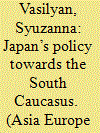| Srl | Item |
| 1 |
ID:
092437


|
|
|
|
|
| Publication |
2009.
|
| Summary/Abstract |
Recently, some commentators have argued that the word 'terrorist' should be abandoned as it has become overloaded with undesirable 'rhetorical' connotations. This view is premised on the assumption that an adequate distinction may be drawn between principled, 'logical' usages and merely 'rhetorical' ones. This article argues that the use of the word 'terrorist' normally has a 'rhetorical' aspect and that theorists must therefore find ways to distinguish between principled and unprincipled rhetorical deployments. I distinguish three rhetorical possibilities for using the word 'terrorist': the first invokes interlocutors' established background commitments to moral and descriptive norms, seeking agreement on the application of the word to a particular case; the second seeks to innovate, challenging either moral norms, descriptive criteria or, less often, the illocutionary force of the term; the third resists innovation but deploys the term in metaphorical ways for moral-rhetorical emphasis. Based on this taxonomy, the article reviews both polemical and scholary debates about definition and then proposes pragmatic, rhetorical considerations for adjudicating between competing definitional arguments. Finally, I review the implications of these considerations for the contentious issue of whether or not the term 'terrorist' properly applies to states.
|
|
|
|
|
|
|
|
|
|
|
|
|
|
|
|
| 2 |
ID:
152937


|
|
|
|
|
| Summary/Abstract |
The article investigates Japan’s foreign policy towards the South Caucasus by unveiling the full range of its paraphernalia. After dwelling on Japan as a foreign policy actor, it delineates the policy vis-à-vis the South Caucasian states of Armenia, Azerbaijan and Georgia along the categories of political dialogue, development assistance and economic cooperation by relying on untapped primary sources. Subsequently, the article analyzes the official discourse pertaining to Japan’s strategy and tactics with respect to the South Caucasus. Ultimately, it provides an explanation by situating the case study within the existing conceptual frameworks of “civilian” and “normative power”. Based on the findings, the article argues that Japan has not been a “normative” but it has been a “civilian power”—a conceptual framework, which can be placed within the theory of neo-liberalism. In a nutshell, even though Japan is an enigmatic actor, it has been predominantly pragmatic in its policy towards the South Caucasus.
|
|
|
|
|
|
|
|
|
|
|
|
|
|
|
|